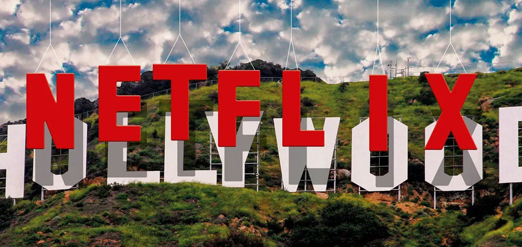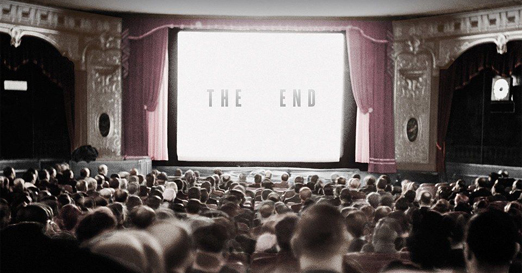
With movie theatre attendance at a two-decade low and profits dwindling, with revenues hovering slightly above $10 billion, Hollywood is on the verge of experiencing the kind of disruption that hit the music, publishing, and related cultural industries a decade ago and more.
Hollywood once ruled the world with must-see movies that would entice people to head to the nearest cinema every weekend. But movie crowds have been declining as more people opt to “Netflix”, and chill at home.
Like other industries, entertainment is feeling the shock of technology and scrambling to adapt to sharply shifting economics. Studios are increasingly banking on big-budget franchise films to bring in bucks. But is that enough?
Wall Street Journal reporter Ben Fritz considered those issues in his book, The Big Picture: The Fight for the Future of Movies.
“Netflix is having a massive impact on Hollywood,” Fritz writes. “They’re disrupting all the traditional economics of television and movies. It’s inescapable how much Netflix has become the TV diet for so many people. Now it’s happening to movies.”
“The movie industry is going through what the record industry has gone through. Subscription streaming is changing the movie business. The music business has had to adapt to people streaming, and that’s going to happen in the movie business. A lot of traditionalists are saying, ‘No, a movie is made to be seen in a theatre.’ That may be what Hollywood wants, but that is not what a lot of consumers want.”
As we wrote in a column published in 2018, in recent years Hollywood has been gun shy about producing romantic comedies.
Netflix, though, has proven just how durable the romcom formula is.
When Lara Condon and Noah Centineo’s To All the Boys I’ve Loved Before débuted last August, it set Netflix streaming records, with over 45 million viewers tuning in. Needless to say, a sequel will be released later this year, as is the case with Joey King’s breakout hit, The Kissing Booth.
Meanwhile, Rose McIver’s The Christmas Prince also spawned a much-anticipated sequel on Netflix this past holiday season.
In 2019, Netflix is set to spend around $18 billion on original programming, most of which is slated for movie production and documentaries, consisting of a 121 movie and documentary slate. Warner Bros.will release 23 films this year, while Disney (Hollywood’s most profitable studio) will début a mere 10. All the Hollywood studios combined in 2019 won’t spend $18 billion on production, and will release only a mere fraction of Netflix’s titles.
Looking into the financial crystal ball, investment firm Goldman Sachs predicts that Netflix could have an annual spending budget of $22.5 billion in 2022, a staggering number that would see Netflix far outstrip the total spending by all of the Hollywood movie studios combined.
With Netflix boasting 139 million subscribers, and growing by millions every month, according to tech mogul Barry Diller, a former senior member of the executive team at Paramount and 20th Century Fox and current Chairman of the Expedia group, “Hollywood is now irrelevant.”

Having disrupted the model for TV broadcasters by making schedules extraneous and grabbing millions of viewers at the same time, Netflix is now making a run at Hollywood. “I think it’s going to be fascinating to watch,” says US journalist Gina Keating, author of Netflixed: The Epic Battle for America’s Eyeballs.
Netflix’s deep pockets have lured Hollywood stars such as Will Smith (Bright), Joel Edgerton, Sandra Bullock (Bird Box), Ben Affleck (Triple Frontier), Kevin Costner and Woody Harrelson (The Highwaymen), Anne Hathaway, Robert DeNiro, Al Pacino and Harvey Keitel, the latter three of whom will star in Martin Scorcese’s $150 million epic, The Irishman, arriving day and date on Netflix and a handful of theatres across the continent this upcoming autumn season, just in time for the Oscars.
And talking about the Oscars, Netflix’s Roma won a slew of Oscars this past Ocotber, winning Best Director, Cinematographer and Foreign Language Film for Alfonso Cuarón, while Period, End of Sentence won Best Documentary. Both films have been available on Netflix since December.
Although Netflix has been around for over two decades, the company’s rise to the top of Hollywood happened in a remarkably short period of time.
House of Cards, Neflix’s first foray into original content, débuted only six years ago. By expending monies to produce more shows and movies, it has managed to grow so rapidly that even its own executives are surprised.
“We’ve outperformed the business in a way we didn’t predict,” David Wells, Netflix’s (now former) chief financial officer, told The Hollywood Reporter in late February, after the company announced that its subscriber base had increased by over seven million in the first two months of 2019, its largest increase ever.
While Hollywood could take control of its fate, it’s very difficult for mature businesses — ones that have operated in similar ways for decades and where the top players have entrenched interests — to embrace change.
One can imagine the future looking something like this: You come home (in a driverless car) and say aloud to Alexa, Siri, Google Home or some A.I. assistant that doesn’t exist yet, “I want to watch a comedy with two female actors as the leads.” Alexa responds, “O.K., but you have to be at dinner at 8pm. Should I make the movie one hour long?” “Sure, that sounds good.” Then you’ll sit down to watch on a screen that resembles digital wallpaper.
At the Consumer Electronics Show this year Samsung débuted a flexible display that rolls up like paper.
There are other, more dystopian theories which predict that film and video games will merge, and we will become actors in a movie, reading lines or being told to “look out!” as an exploding car comes hurtling in our direction, not too dissimilar from Mildred Montag’s evening rituals in Fahrenheit 451.
When we finally get there, you can be sure of two things.
The bad news is that many of the people on the set of a standard Hollywood production won’t have a job anymore. The good news?
You’ll never be bored again.
